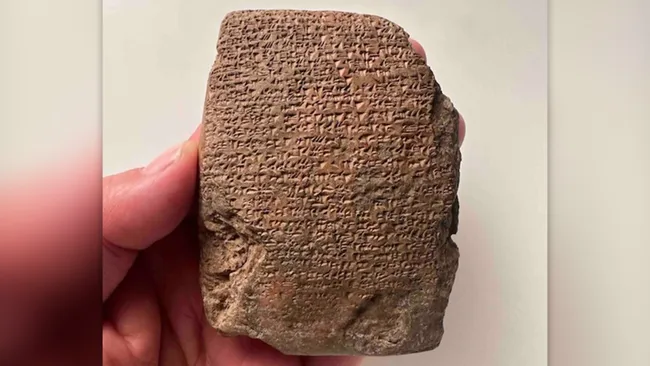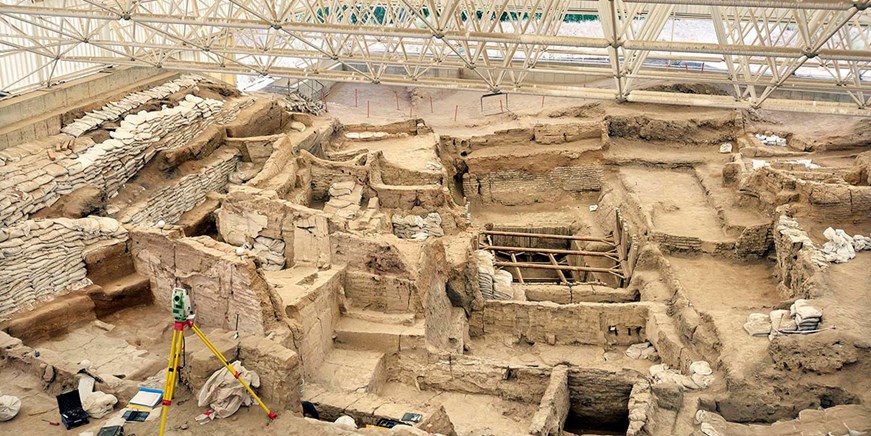
A rare 3,300-year-old bronze helmet from the Hittite Empire is on display at the Çorum Archaeology Museum
The 3,300-year-old bronze helmet unearthed during the excavations carried out in 2002 at the ruins of Şapinuva, one of the important cult centers of the Hittite Empire, is among the rare artifacts that have survived from the Hittite period. The Hittite bronze helmet discovered during excavations at the ruins of Şapinuva in Ortaköy district of

Archaeologists find 1,000-year-old bone skate
Archaeologists have discovered a 1,000-year-old bone skate in Přerov, Czech Republic. The find is seen as evidence that people in the region practiced winter sports in the Middle Ages. The skate was found during an archaeological excavation in the historic center of Přerov. The excavation is being carried out by archaeologists from the Přerov Museum

France will return 8,659 historical artifacts seized to Turkey
Minister of Culture and Tourism Mehmet Nuri Ersoy announced on social media that 8,659 historical artifacts seized in France will be returned to Turkey. “We are getting back 8,659 of our artifacts seized in France! It all started in 2019 when the Anti-Smuggling Department of our Ministry detected a large number of coins of Anatolian

Greek archaeologists find 5,000-year-old shipwrecks in the Aegean Sea
Archaeologists in Greece have made an exciting discovery near the island of Kasos, located in the southern Aegean Sea. Kasos (Greek: Κάσος), mentioned in Homer’s Iliad, is an island southwest of Crete and northwest of Karpathos. Since 2019, the National Hellenic Research Foundation research team, working in collaboration with the Ministry of Culture, has discovered

A 3,300-year-old tablet found at Büklükale tells of a catastrophic foreign invasion of the Hittite Empire
The Hittite Empire, considered to be the first centralized state of Anatolia, began to rise around 1600 BC and formed a strong political and military union. After ruling for nearly 400 years, the empire suddenly collapsed around 1200 BC. This sudden collapse has remained a mystery that has been investigated by historians and archaeologists for

Magnet fisherman pulls out a sturdy Viking sword from the River Cherwell
Magnet fisherman Trevor Penny pulled a intact Viking sword from the River Cherwell in West Oxfordshire last November. Magnet fishing, also known as magnet fishing, is the hobby of searching for ferromagnetic objects in open waters that can be attracted using a powerful neodymium magnet. This hobby is a combination of environmentalism and treasure hunting.

American archaeologists discover 13,000-year-old beads at La Prele Mammoth Site
Archaeologists have made an important discovery at the La Prele Mammoth site in Converse County, Wyoming in the United States. A bead made of bone, dated to around 13,000 years ago, is the oldest known bead in the Americas. The discovery offers new insights into the artistic and technological skills of Clovis Period people and

Plough marks discovered in Switzerland suggest that animals were used in agriculture in Europe 7,000 years ago
Archaeologists have discovered evidence that Neolithic farmers at the Anciens Arsenaux site in Sion, Switzerland, used animals to pull plows between 5,100 and 4,700 years ago. This discovery is about 1,000 years older than the earliest known traces of plows and provides new insights into the beginnings of agricultural animal use in Europe. According to

The earliest evidence of Christianity in Bulgarian lands has been discovered
Early Christians in the Roman Empire were forced to conceal their faith. This was because Christianity was not officially recognized by the Roman Empire and was seen as a threat. Christians were persecuted and executed in various parts of the Roman Empire. To conceal their faith, early Christians conducted their worship in secluded places. These

Archaeologists discover 8,600-year-old world’s oldest bread at Çatalhöyük
Excavations at Çatalhöyük, one of the first urbanization sites of the Neolithic period, unearthed 8,600-year-old “bread”. Archaeologists say the bread may be the oldest known bread in the world. Çatalhöyük is located in the Çumra district of Konya province in central Turkey. In Çatalhöyük, people lived in adjoining mud-brick houses with roof entrances and established
